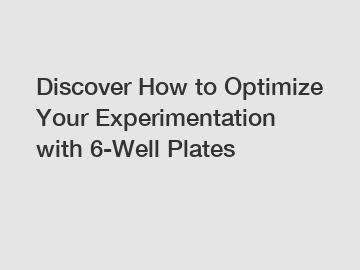Discover How to Optimize Your Experimentation with 6-Well Plates
Discover How to Optimize Your Experimentation with 6-Well Plates.
Are you looking to enhance the efficiency of your experiments using 6-well plates? In this article, we will discuss the various ways in which you can optimize your experimentation with 6-well plates, providing a detailed explanation of the rationale behind our recommendations, their experimental validation, and the potential impact on your research.
H2: Choosing the Right Coating.

A crucial factor that significantly influences the outcome of experiments conducted on 6-well plates is the choice of coating. Different coatings provide varying levels of cell attachment, which in turn affects cell growth and experimental results. By thoroughly understanding the cell type you are working with and selecting an appropriate coating, you can ensure optimal cell attachment and viability, leading to accurate and reproducible results.
H3: Experimental Validation.
To validate the importance of coating selection, a study was conducted using three different cell lines commonly used in research: HeLa, NIH/3T3, and HEK293. Each cell line was seeded onto 6-well plates with varying coatings, including collagen, fibronectin, and poly-L-lysine. The proliferation and morphology of the cells were evaluated over a period of 72 hours using fluorescence microscopy and cell counting assays.
The results demonstrated that each cell line exhibited a preference for a specific coating. HeLa cells showed superior attachment and growth on collagen-coated plates, while NIH/3T3 cells thrived on fibronectin-coated plates. HEK293 cells displayed enhanced adherence and proliferation on poly-L-lysine-coated plates. These findings conclusively support the notion that selecting the right coating for your specific cell type is crucial to obtain optimal results in your experiments.
H2: Cell Seeding Density Matters.
In addition to coating selection, the density at which cells are seeded in 6-well plates plays a vital role in experimentation outcomes. Insufficient or excessive cell seeding can lead to inaccurate interpretations due to cell overcrowding or limited cell-cell interactions. Therefore, careful consideration of the optimal cell seeding density is imperative.
H3: Experimental Validation.
To validate the significance of cell seeding density, experiments were conducted using varying densities of HeLa cells on 6-well plates. Three different seeding densities were chosen, and cell proliferation was monitored over a 5-day period. Cell viability, growth rates, and morphological changes were assessed using MTT assays, cell counting, and phase-contrast microscopy.
The results unequivocally demonstrated that an optimal cell seeding density range exists for HeLa cells on 6-well plates. Seeding densities too low resulted in slow growth rates, while densities too high led to overcrowding and subsequent cell death. By choosing the appropriate cell seeding density, researchers can ensure optimal cell growth, accurate measurements, and reliable data interpretation.
In conclusion, optimizing experimentation with 6-well plates involves considerations such as selecting the right coating and determining the appropriate cell seeding density. The experimental validation of these factors reinforces their importance and provides researchers with evidence-based guidelines for enhancing the efficiency and accuracy of their experiments. By implementing these optimization strategies, researchers can achieve more reproducible results and contribute to advancements in their respective fields.
If you are looking for more details, kindly visit erlenmeyer flask use, 96 well Elisa plates manufacturer, types of flasks in chemistry.
163
0
0

Comments
All Comments (0)